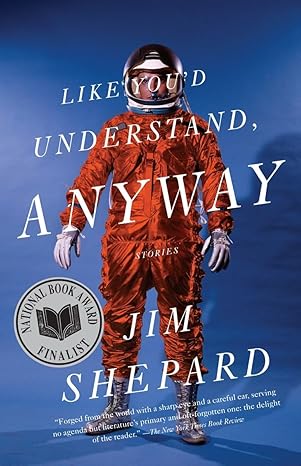Author: Jim Shepard
Like You’d Understand, Anyway is a collection of short stories by Jim Shepard tackling the everyday life of various characters who live in various countries. The stories are not connected apart from several stories tackling the relationship between brothers. These elements are interesting because they often tackle hostility and jealousy between siblings. It is also an interesting focus on boys because very often when we read short stories or stories of siblings, the focus is on girls, so this was very different and relevant for a reflection on how boys experience early socialisation experiences.
My favourite story was the first one in the book about three brothers from the Soviet Union who lived in Ukraine during the Chornobyl disaster when a nuclear reactor exploded. I thought this story was very interesting because it did not just narrate a story of three brothers, one of whom is an engineer working on the reactor and highly positioned in the regime and thus looks after his two brothers with some jealousy visible. This story is also a critique of the Soviet Union regime and its alleged superiority, and it is written in the first person as the other stories in the book.
The other stories in the Shepard’s book include also a family story of a father looking for a magazine, and creating a domestic situation out of it, which mirrors abusive behaviour. The obsession with a missing magazine is quite peculiar when one of the children is seriously ill and has a health condition, thus the story shows a family dynamic in an abusive context. This story is situated in the US. Then there is also an interesting story of a boy whose father left, and his younger brother does not know who he was because he was only two years old when he left. Then a story of a Nazi officer visiting Tibet and trying to scientifically prove Aryan superiority, which again provides a criticism of the regime, in a similar tone to the Soviet story at the beginning of the book. Then there is also a compelling story of a boy whose mother gave him up for adoption after a natural disaster they experienced with a tidal wave smashing their house and killing his mom’s friend who was housing them. The boy then has issues in his marriage, which is not surprising given the family separation, mom left the father initially and then abandoned the boy too, and the story shows the influence of early childhood on behaviour and communication later in life, which I found compelling because it mirrors my research (e.g., a study on leadership styles respective to early childhood experiences). Then there is a travel diary of brothers who travel around Australia and who were also abandoned by their father when they were children.
There are more stories in the book, both American and Soviet, but the above ones were the most compelling to me. The underlying message of this book seems to be centred on the impact of early childhood and bad parenting, on sibling relations. It is a book of stories that tackle families and how things do or do not work out for people, most of the time they don’t work out and people carry issues from childhood forward.
As with To Paradise, I do not like that stories are unfinished, but I know that is just me. I always prefer to have an author tell me their version of the ending, but I can see why the author did this. Every one of us can find a story of our childhood and how it affected us in life so in a way, these stories are illustrations of what has been and what could have been. The only criticism of this book I have is that childhood stories are not always explored in-depth, which is why I rarely read short stories. I get that it is not easy to write it up, but this is what was missing for me. I was very interested in the childhood experiences mentioned in all the stories and wanted more.
Overall, this was a different reading experience because I do not normally read short stories. Very interesting, even if underdeveloped for my taste. But I am not a fan of short stories. People who enjoy this type of literature will love this collection because stories are arguably longer than in conventional books of short stories.
Thank you for reading!
